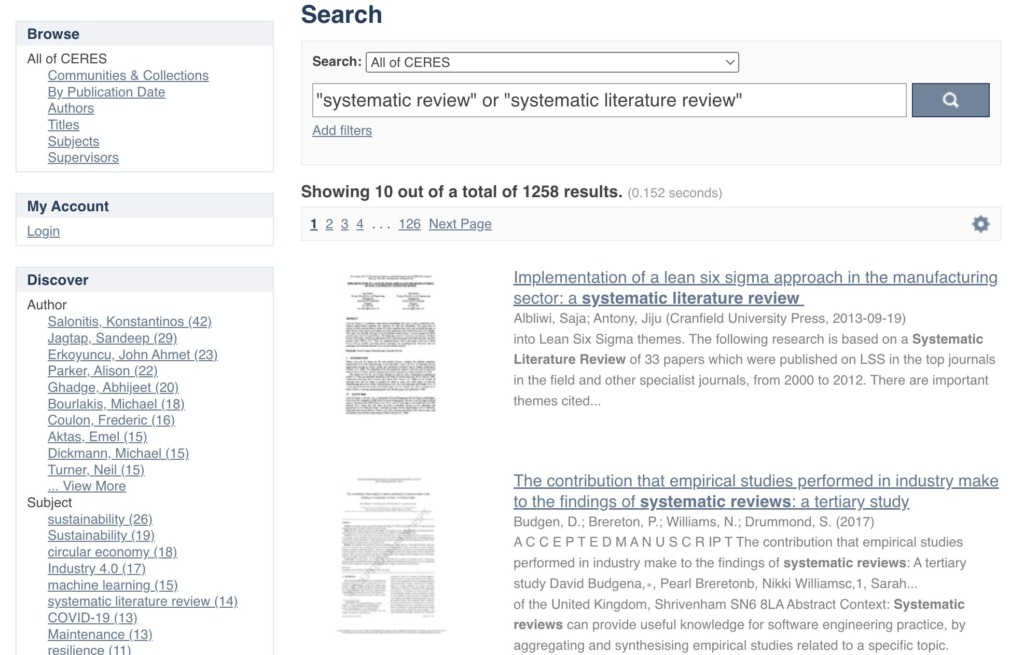Systematic Literature Review – Where do I begin?
15/02/2024

Undertaking a systematic literature review can seem a bit daunting so breaking it down into separate stages is a good way to begin. In this blog post we’re going to identify some background reading and show you how to find previous systematic literature reviews.
Useful background reading
Both the School of Management (SOM) Library and the Kings Norton Library have several books which offer guidance on how to conduct or approach a structured or systematic literature review. Check out the reading list or use Library Search to identify books on the topic, shelf mark 3.001. Popular titles are:
- Doing a systematic review: A student’s guide – Boland, A., Cherry, G. M., & Dickson, R.
- The literature review: A step-by-step guide – Ridley, D
- Systematic approaches to a successful literature review – Booth, A., Papaioannou, D., & Sutton, A.
- Conducting research literature reviews: From the internet to paper – Fink, A.
- Doing a literature review: Releasing the social science research imagination – Hart, C.
There are also some very good articles on the topic e.g.:
- Tranfield, D., Denyer, D., & Smart, P. (2003). Towards a methodology for developing evidence-informed management knowledge by means of systematic review. British Journal of Management, 14(3), 207-222. https://doi.org/10.111/1467-8551.00375
Further articles and guides can be found by searching our databases, such as Scopus, Web of Science, ProQuest One Business (includes ABI/INFORM), EBSCO Business Source Complete and Sage Research Methods. There is also guidance on our website for writing your thesis and conducting a literature review which will take you through the steps of the systematic literature review.
Previous systematic literature reviews
Looking at previous systematic literature reviews is a really good way of understanding what is required and how the reviews should be structured and written up. Non-restricted Masters and Doctoral theses can be found in our Masters Theses Archive (MSc) and in CERES our institutional repository (DBA, PhD and MRes).
In both you can find relevant theses by searching for “systematic literature review” in the search box. It is also worth trying “systematic review” as this may retrieve a few additional results. It is also worth trying “systematic review” as this may retrieve a few additional results.

Search results in CERES
You may decide that you wish to look at theses in your subject area but sometimes it can be helpful to look at theses on a different topic so that you concentrate on the structure and layout rather than the content. The choice is yours!
Next steps…
Once you’ve had a look at these and found out what is required, you’re ready to go onto the next stage. This will be defining your research question, selecting your sources, identifying your own search terms and how to construct your search strings to ensure that your literature review really is systematic.
As always, if you have any questions on the systematic review or on any other area of your research, please do not hesitate to contact the Library.
Categories & Tags:
Leave a comment on this post:
You might also like…
Setting up a shared group folder in a reference manager
Many of our students are now busy working on their group projects. One easy way to share references amongst a group is to set up group folders in a reference manager like Mendeley or Zotero. ...
Company codes – CUSIP, SEDOL, ISIN…. What do they mean and how can you use them in our Library resources?
As you use our many finance resources, you will probably notice unique company identifiers which may be codes or symbols. It is worth spending some time getting to know what these are and which resources ...
Supporting careers in defence through specialist education
As a materials engineer by background, I have always been drawn to fields where technical expertise directly shapes real‑world outcomes. Few sectors exemplify this better than defence. Engineering careers in defence sit at the ...
What being a woman in STEM means to me
STEM is both a way of thinking and a practical toolkit. It sharpens reasoning and equips us to turn ideas into solutions with measurable impact. For me, STEM has never been only about acquiring ...
A woman’s experience in environmental science within defence
When I stepped into the gates of the Defence Academy it was the 30th September 2019. I did not know at the time that this would be the beginning of a long journey as ...
Working on your group project? We can help!
When undertaking a group project, typically you'll need to investigate a topic, decide on a methodology for your investigation, gather and collate information and data, share your findings with each other, and then formally report ...






